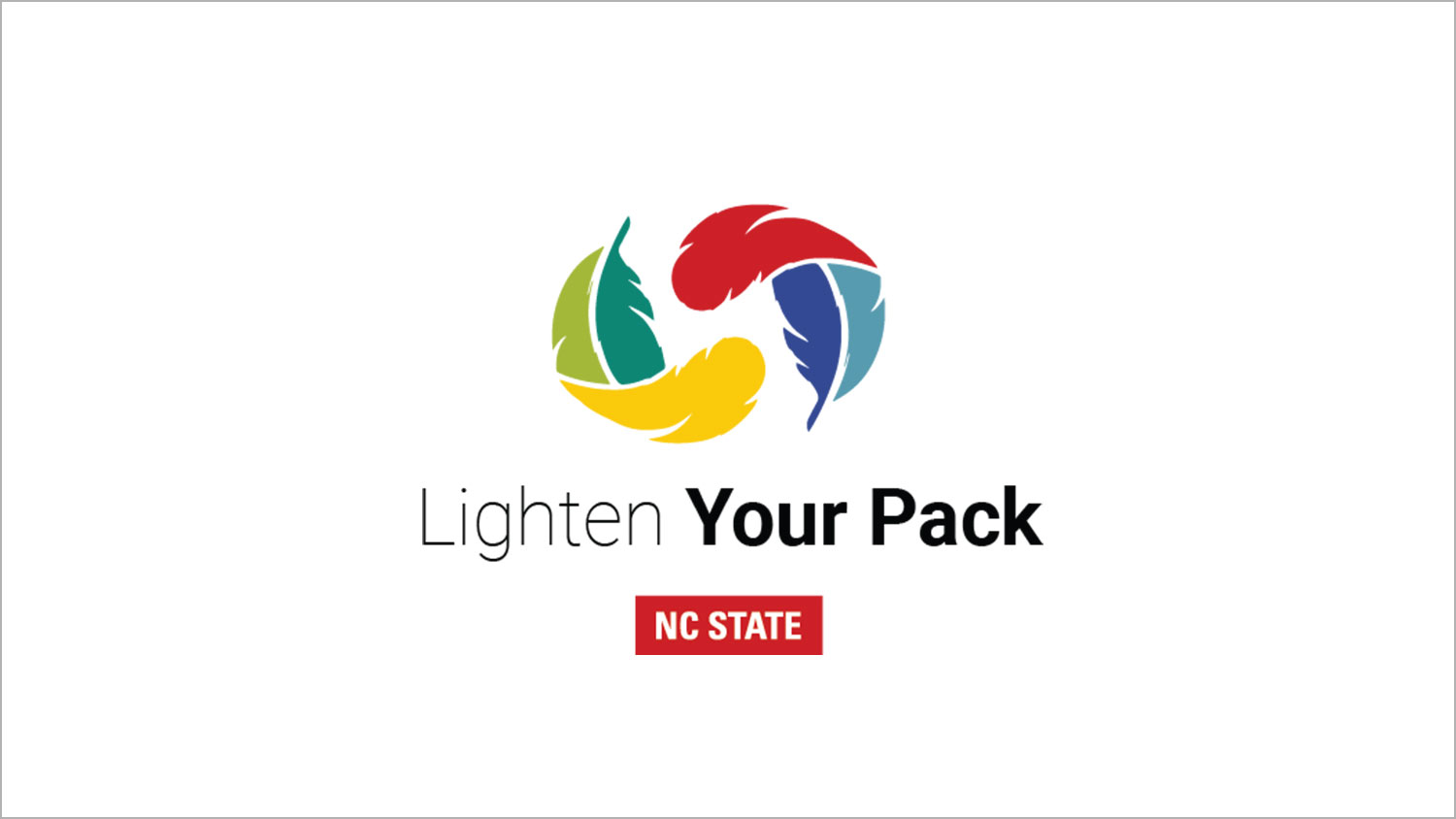Lighten Your Pack Toolkit
University Communications and Marketing, in collaboration with the Division of Academic and Student Affairs, has developed a campuswide mental health and well-being campaign. Below, you'll find the toolkit we developed to help NC State communicators share wellness-related messages with students and employees.

Campaign Theme
From academic stress and personal obligations to relationships and planning for the future, we all carry a lot with us. “Lighten Your Pack” encourages students and employees alike to evaluate what they’re carrying with them each day and use the resources available to help them manage the stresses of their load. This central theme also encourages empathy and community by suggesting we can all come together to lighten our Pack.
As you plan and execute your communications for the year, the university’s Wolfpack Wellness website is your one-stop shop for information, resources and upcoming events related to mental health and well-being. Use this toolkit to supplement and guide your wellness-related messages.
Visual Assets

Key Messages
- Use our campus resources to support your well-being and take care of your whole self.
- Reach out to others and ask how you can help lighten their pack — you never know what they may be struggling to carry.
- No matter your role — student, faculty member, staff member, leader, mentor — you can help shape our community for the better and build a community of care for yourself and our Wolfpack.
Below you’ll find additional messages to support your wellness-related communication efforts all year long.
Our campus resources are designed to help you care for your whole self.
Empower your audience to find balance by prioritizing holistic wellness. Highlight wellness.ncsu.edu as a resource hub that provides easy access to a wide variety of support for students and employees.
- No matter what you’re looking for, we have campus resources for you. From physical and emotional health to financial wellness and community-building, support is available.
- Maintaining your mental health takes care and intention every day. Establishing and maintaining a healthy mindset is about aiming for progress, not perfection.
- Looking for ways to lighten your pack? Explore on- and off-campus resources.
- Example: Have you met your college’s embedded counselor? Stop by during drop-in hours and get support where you need it most.
Find a way to lighten someone’s pack today.
Use your messaging to express and cultivate empathy within our community. Encourage your audience to familiarize themselves with the resources and groups available, to better connect those in need with the right support.
- Explore trainings and programs offered at NC State to help you take charge of your own well-being and support others along the way.
- Care goes both ways: Sometimes you may need help to lighten your load, and other times you can offer that same support to others. Be a part of someone else’s community of care.
- The easiest way to show someone you care is to tell them. Ask how your friends and classmates are doing, and listen to their response to learn how you can best support them.
- Example: Invite a friend to drop in to one of 12 spaces cultivated for wellness and connection with specific interests in mind.
Together, it’s easier to lighten our Pack.
Communicate the importance of community and the spaces where your audience can feel like they belong at NC State. Share ways students and employees alike can find and build their own support networks.
- A community of care is a broad support network that fosters well-being and belonging for all. Consider how you can care for others by sharing your talents, passions and experiences through a campus organization, Student Government or a dedicated program or service.
- We know that feeling connected and getting involved looks different for everyone. Find your sense of belonging as a member of the NC State community on your terms, at your speed and in the ways that matter to you.
- Example: Helping yourself — and others — prioritize mental health doesn’t have to be difficult. Sign up for a training and development session today, and expand your wellness knowledge base.

Content Strategy
NC State values representation, community and collaboration. These ideas are central to fulfilling our strategic goals to empower students for a lifetime of success and impact as well as championing a culture of belonging and well-being in all we do. Our values are guiding lights for the campaign identity “Lighten Your Pack,” and they resonated with students involved in the research and feedback process that led to the creation of this toolkit and overall campaign.
If you’re looking for inspiration, explore our sample content calendar developed by the Social Media Strategy Hub, in line with the social team’s own calendar for the year. As you’re deciding what content to prioritize, keep the following themes in mind.
Agency: We maintain our mental health every day through the actions we take and the words we speak to ourselves and those around us. Taking care of ourselves looks different for everyone. Share stories and messages that highlight a variety of ways to take action, find the right support and make connections on campus.
Empathy: Remember, we’re all human. Remind your audience to be kind to themselves and those around them. Stories of friendship and support can show what empathy looks like, no matter the role someone plays on our campus.
Community: There are countless ways to find your Wolfpack at NC State. Where can your audience find community? Share positive messages that focus on the various groups and spaces that help foster belonging.

Order Campaign Swag
The Division of Academic and Student Affairs (DASA) has ordered an initial round of stickers and buttons to distribute at the start of the academic year. If you’d like to place an order for your college or division, follow these instructions to place an order in Marketplace:
- In Marketplace, select Roberts Group
- Select “Featured” from the main menu
- Search for “Lighten Your Pack” for a 2.25” button or for a 3” sticker
- Checkout and complete the purchasing process in Marketplace
Frequently Asked Questions
What resources should we prioritize sharing?
Use wellness.ncsu.edu as your one-stop shop for upcoming events, trainings and ways to share opportunities for support on campus. The site will soon include a filterable resource list to allow students and employees to quickly and easily find a resource that matches their needs.
- For students: Highlight the range of support programs and offices students have at their disposal. Encourage self-care, community and engagement — and share reminders about the breaks built into the academic calendar, like wellness days.
- Student Involvement, campus centers and countless other spaces on campus offer valuable points of connection for those looking to build community.
- For students seeking support for their mental health, the Counseling Center and a telehealth platform are valuable resources available at no charge.
- The Pack Essentials program provides resources to help meet students’ basic needs, including challenges related to food, housing and financial insecurity.
- The Counseling Center and Prevention Services maintain pages of Self Help Resources and training opportunities for students looking to learn more about suicide prevention and similar opportunities.
- For employees: Encourage employees to take advantage of the resources available throughout campus and to speak with their supervisors about using accrued leave time to support their well-being as needed. Community service, personal day of observance, sick leave and vacation leave are all valuable ways to rest and recharge.
- Wolfpack Wellness and University Human Resources provide regular opportunities and resources to support holistic health.
- State Health Plan members have access to mental health coverage and additional resources via the Behavioral Health Resource Center. Employees can use the resource center to find a mental health care provider, some of whom can be seen for a $0 copay under the Clear Pricing Project.
- The Faculty and Staff Assistance Program, the Employee Emergency Loan Program and Feed the Pack food pantry are all in place to ensure employees have the resources needed to overcome financial and situational hardships.
- QPR trainings are available via the Counseling Center for those seeking additional instruction on supporting colleagues and students. The center also maintains a useful off-campus referral database to help connect those looking for longer-term treatment or specialized services with an off-campus provider.
Who can I ask about the Lighten Your Pack campaign or universitywide efforts to support mental health and well-being?
- For questions or support regarding the campaign, email Rachel Montesinos Jorro, director of public relations with University Communications and Marketing.
- For questions specific to NC State’s Counseling Center, Prevention Services or Campus Health, email Steph Wisnet, senior marketing manager with DASA.
- For questions on what the university is doing to broadly address mental health and well-being needs, or for media-related questions, email Mary Cole Pike, executive director of communications with University Communications and Marketing.
Are there offices I can forward calls or emails to?
If your team is not equipped to respond to a question or inquiry, outreach may be directed to one of the following campus offices.
- Direct media-related questions to University Communications and Marketing.
- Direct prevention-related questions to Prevention Services at 919-515-4405.
- Questions regarding counseling services can be directed to the Counseling Center at 919-515-2423.
- Encourage faculty, staff and parents expressing concern about a student to submit a CARES report.
- Questions about the student mental health task force should be directed to DASA. Be sure to share this website with those inquiring about updates.
- Questions about housing can be directed to University Housing’s office line at 919-515-3088.
- Questions specific to families should be directed to Parents and Families Services at 919-515-2441.
Last Reviewed On: 2/27/2025